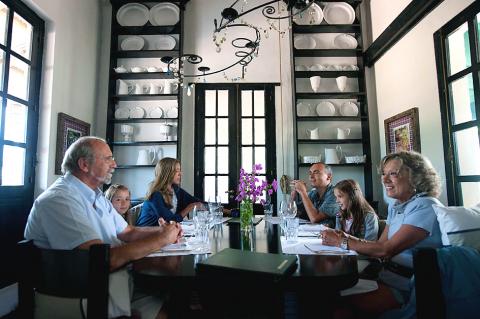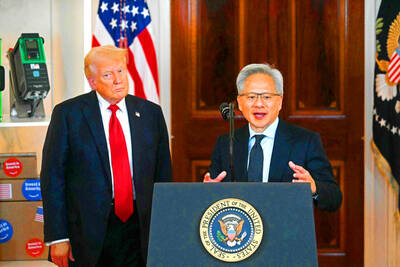It is a dusty village of 200 nestled in Uruguay’s back country, with no obvious architectural attraction, which most tourists would drive through without a second thought.
However, in recent years, the town of Pueblo Garzon, 70km from the bustling beach resort of Punta del Este, has become a draw for the international jet set looking for peace and quiet, along with authenticity and a taste of some unique gastronomy.
The transformation of the modest village began eight years ago when renowned Argentine chef Francis Mallmann opened a hotel and restaurant on a site where a grocery store used to be.

Photo: AFP
That attracted some well-heeled visitors and started a trend in the village of dirt roads and lush tropical vegetation.
Today, the streets are lined with luxury cars, high-end restaurants and boutiques and plenty of visitors from around the globe willing to spend US$170 for lunch or US$780 for a hotel room with rustic charm during the high season of December to February.
In the town, which had been a stop for travelers in the mountains and the site of wheat mill, visitors can dine on smashed gigot of lamb, magret of duck with malbec juice and varietal wines from the region.
They can stay overnight in rooms with wood-burning chimneys and other refinements.
“The idea is to allow customers to relax, to take horseback or bicycle rides, to take advantage of nature, silence and good food, and to get away from the city, the beach and the crowds,” said Victoria Ubertone, hotel manager at the Garzon hotel and restaurant.
“The calm is impressive. It is a back country village like a lot of others, but very chic,” said Monica Testoni, an Argentine who was vacationing in Punta del Este and made a trip for lunch to Garzon.
Across the town square, another famed Argentine chef, Esteban Aguirre, recently opened his restaurant and cultural center called D’Cepa, encouraged by the success of Mallmann and others.
Along with Lucifer, the other upscale restaurant in town, “we are trying to round out our offerings for tourists,” Aguirre said.
The influx of wealthy tourists along with the installation of a food processing plant in 2000 is a godsend for local residents, who had been hoping for a restoration of a rail link that was abandoned when a wheat mill shut down.
“There is a change in the outlook for people,” Garzon Mayor Fernando Suarez said. “The village is finding a new direction.”
With the town’s transformation, more people are seeking to build homes, in some cases hiring local residents for upkeep. Some of those investing, according to locals, include British art dealer Martin Summers and a top executive of the New York Times.
This has caused a jump in land prices, so a lot of 400m2, which used to sell for US$1,000 now can go for upwards of US$30,000.
Suarez said this is not a problem because “those who come here respect the essence of the village.”
However, others like Veronica Deliotti, a restaurant worker, wonders if the small town atmosphere is disappearing.
“Our children’s future is changing,” she said. “Sometimes I’m afraid. We don’t want to lose this tranquility.”

Taiwan Semiconductor Manufacturing Co (TSMC, 台積電) last week recorded an increase in the number of shareholders to the highest in almost eight months, despite its share price falling 3.38 percent from the previous week, Taiwan Stock Exchange data released on Saturday showed. As of Friday, TSMC had 1.88 million shareholders, the most since the week of April 25 and an increase of 31,870 from the previous week, the data showed. The number of shareholders jumped despite a drop of NT$50 (US$1.59), or 3.38 percent, in TSMC’s share price from a week earlier to NT$1,430, as investors took profits from their earlier gains

AI TALENT: No financial details were released about the deal, in which top Groq executives, including its CEO, would join Nvidia to help advance the technology Nvidia Corp has agreed to a licensing deal with artificial intelligence (AI) start-up Groq, furthering its investments in companies connected to the AI boom and gaining the right to add a new type of technology to its products. The world’s largest publicly traded company has paid for the right to use Groq’s technology and is to integrate its chip design into future products. Some of the start-up’s executives are leaving to join Nvidia to help with that effort, the companies said. Groq would continue as an independent company with a new chief executive, it said on Wednesday in a post on its Web

CHINA RIVAL: The chips are positioned to compete with Nvidia’s Hopper and Blackwell products and would enable clusters connecting more than 100,000 chips Moore Threads Technology Co (摩爾線程) introduced a new generation of chips aimed at reducing artificial intelligence (AI) developers’ dependence on Nvidia Corp’s hardware, just weeks after pulling off one of the most successful Chinese initial public offerings (IPOs) in years. “These products will significantly enhance world-class computing speed and capabilities that all developers aspire to,” Moore Threads CEO Zhang Jianzhong (張建中), a former Nvidia executive, said on Saturday at a company event in Beijing. “We hope they can meet the needs of more developers in China so that you no longer need to wait for advanced foreign products.” Chinese chipmakers are in

POLICY REVERSAL: The decision to allow sales of Nvidia’s H200 chips to China came after years of tightening controls and has drawn objections among some Republicans US House Republicans are calling for arms-sale-style congressional oversight of artificial intelligence (AI) chip exports as US President Donald Trump’s administration moves to approve licenses for Nvidia Corp to ship its H200 processor to China. US Representative Brian Mast, the Republican chairman of the US House Committee on Foreign Affairs, which oversees export controls, on Friday introduced a bill dubbed the AI Overwatch Act that would require the US Congress to be notified of AI chips sales to adversaries. Any processors equal to or higher in capabilities than Nvidia’s H20 would be subject to oversight, the draft bill says. Lawmakers would have